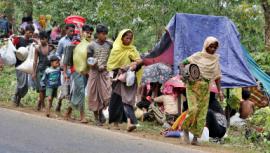Raise RMG basic pay by 70pc

Union leaders yesterday urged the government to revise a recently announced hike in garment workers' basic pay from 32 percent to 70 percent.
This will raise other fringe benefits proportionately to make the overall wage sufficient for leading a decent life, they said. A government-formed wage board last month announced a raise in the minimum monthly wage for 4.4 million garment workers to Tk 8,000 from the existing Tk 5,300 with effect from December.
The basic was raised to Tk 4,100 from Tk 3,100, which was last fixed in 2013.
The leaders also pointed out that only the pay for the seventh grade was hiked, leaving out the remaining six.
Only five percent of workers belong to the seventh grade, meaning that a majority of them are serving as operators and senior operators in the other grades, said Amirul Haque Amin, president of National Garment Workers Federation.
“So the announced salary structure needs to be reviewed,” he told a roundtable on “RMG workers' wage revision: reality and way forward” organised by the Bangladesh Institute of Labour Studies (BILS) at The Daily Star Centre in Dhaka.
Over 80 percent of garment workers are operators, said Kamrul Ahsan, president of Jatiya Sramik Federation, another trade union. “So, the salaries of those workers also need to be increased,” he said.
Salahuddin Swapan, secretary general of the IndustriALL Bangladesh Council, said the labour law stipulates that the basic pay doubles in every wage revision but it clearly did not happen in this case.
He blamed the government, saying its interference in the determination of the basic pay caused it to remain low.
Sirajul Islam Rony, a union leader, said though there was still scope for bargaining to increase the salary, it required unity among union leaders.
Jafrul Hasan Sharif, a Supreme Court lawyer, said the rules of the service do not allow the factory management to take back financial benefits once it was given to workers.
Unfortunately owners of many factories are renouncing old benefits only to provide it again under new names in the salary package, he said.
The concept of a national minimum wage cannot be established in the country for a lack of legal measures, said Chowdhury Ashiqul Alam, general secretary to Bangladesh Trade Union Sangha, another union.
Garment buyers should keep workers in mind while settling prices and make sure that factory owners deliver this additional amount to workers, he said.
Khondaker Golam Moazzem, research director of the Centre for Policy Dialogue, reasoned why they proposed Tk 10,028 as minimum monthly salary, which was way below the union leaders' demand for Tk 16,000. Both were rejected by the government.
He said they took into consideration a recent increase in the number of income generating people in a garment worker's family, from 1.4 to 2.1.
Assistant Professor Mostafiz Ahmed of Jagannath University said the minimum wage was fixed keeping in mind the number of family members, general wage of the country, living costs, social security benefits, living standards of other social groups, productivity and prices of products.
Ahmed presented a keynote paper at the event, chaired by Mojibur Rahman Bhuiyan, vice-chairman of the BILS.
